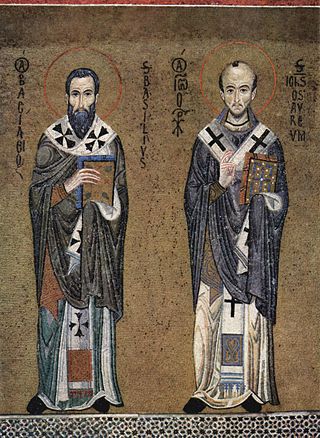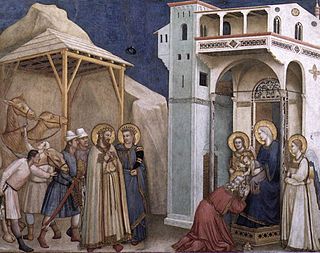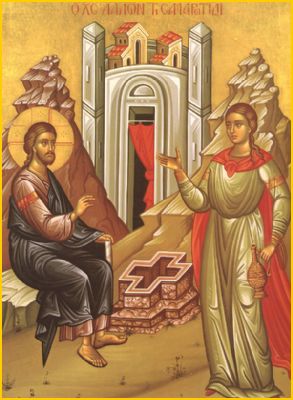
Great Lent, or the Great Fast, is the most important fasting season of the church year within many denominations of Eastern Christianity. It is intended to prepare Christians for the greatest feast of the church year, Pascha (Easter).

The liturgical year, also called the church year, Christian year or kalendar, consists of the cycle of liturgical seasons in Christian churches that determines when feast days, including celebrations of saints, are to be observed, and which portions of Scripture are to be read either in an annual cycle or in a cycle of several years.

Advent is a season observed in most Christian denominations as a time of expectant waiting and preparation for both the celebration of the Nativity of Christ at Christmas and the return of Christ at the Second Coming. Advent is the beginning of the liturgical year in Western Christianity. The name was adopted from Latin adventus "coming; arrival", translating Greek parousia from the New Testament, originally referring to the Second Coming.

Divine Liturgy or Holy Liturgy is the Eucharistic service of the Byzantine Rite, a liturgical rite developed from the Antiochene Rite of Christian liturgy which is that of the Ecumenical Patriarchate of Constantinople. As such, it is used in the Eastern Orthodox, the Greek Catholic Churches, and the Ukrainian Lutheran Church. Although the same term is sometimes applied in English to the Eucharistic service of Armenian Christians, both of the Armenian Apostolic Church and of the Armenian Catholic Church, they use in their own language a term meaning "holy offering" or "holy sacrifice". Other churches also treat "Divine Liturgy" simply as one of many names that can be used, but it is not their normal term.

The Twelve Days of Christmas, also known as Twelvetide, is a festive Christian season celebrating the Nativity of Jesus. In some Western ecclesiastical traditions, "Christmas Day" is considered the "First Day of Christmas" and the Twelve Days are 25 December to 5 January, inclusive, with 6 January being a "thirteenth day" in some traditions and languages. However, 6 January is sometimes considered Twelfth Day/Twelfth Night with the Twelve Days "of" Christmas actually after Christmas Day from 26 December to 6 January. For many Christian denominations—for example, the Anglican Communion and Lutheran Church—the Twelve Days are identical to Christmastide, but for others, e.g. the Roman Catholic Church, Christmastide lasts longer than the Twelve Days of Christmas but the Christmas itself lasts one day on December 25.

A lectionary is a book or listing that contains a collection of scripture readings appointed for Christian or Jewish worship on a given day or occasion. There are sub-types such as a "gospel lectionary" or evangeliary, and an epistolary with the readings from the New Testament Epistles.
The Eastern Orthodox liturgical calendar describes and dictates the rhythm of the life of the Eastern Orthodox Church. Passages of Holy Scripture, saints and events for commemoration are associated with each date, as are many times special rules for fasting or feasting that correspond to the day of the week or time of year in relationship to the major feast days.
Orthros or Útrenya, in the Byzantine Rite of the Eastern Orthodox Church and the Eastern Catholic Churches, is the last of the four night offices, the other three being vespers, compline, and midnight office. Traditionally, in monasteries it is held daily so as to end immediately following sunrise, in contrast to parishes where it is held only on Sundays and feast days. It is often called matins after the office it most nearly corresponds to in Western Christian churches.

In Christian liturgy, a vigil is, in origin, a religious service held during the night leading to a Sunday or other feastday. The Latin term vigilia, from which the word is derived meant a watch night, not necessarily in a military context, and generally reckoned as a fourth part of the night from sunset to sunrise. The four watches or vigils were of varying length in line with the seasonal variation of the length of the night.
In Christianity, the Nativity Fast—or Fast of the Prophets in Ethiopian Orthodox Tewahedo Church and Eritrean Orthodox Tewahedo Church—is a period of abstinence and penance practiced by the Eastern Orthodox Church, Oriental Orthodox Church and Catholic Church in preparation for the Nativity of Jesus on December 25. Ethiopian and Eritrean Orthodox Churches commence the season on November 24th and end the season on the day of Ethiopian Christmas which falls on 7th of January. The corresponding Western season of preparation for Christmas, which also has been called the Nativity Fast and St. Martin's Lent, has taken the name of Advent. The Eastern fast runs for 40 days instead of four or six weeks and thematically focuses on proclamation and glorification of the Incarnation of God, whereas the Western Advent focuses on three comings of Jesus Christ: his birth, reception of his grace by the faithful, and his Second Coming or Parousia.
"Octave" has two senses in Christian liturgical usage. In the first sense, it is the eighth day after a feast, reckoning inclusively, and so always falls on the same day of the week as the feast itself. The word is derived from Latin octava (eighth), with dies (day) understood. In the second sense, the term is applied to the whole period of these eight days, during which certain major feasts came to be observed.

The Nativity of John the Baptist is a Christian feast day celebrating the birth of John the Baptist. It is observed annually on 24 June. The Nativity of John the Baptist is a high-ranking liturgical feast, kept in the Catholic Church, Eastern Orthodox Church, Anglicanism, and Lutheranism. The sole biblical account of the birth of John the Baptist comes from the Gospel of Luke.
A memorial service is a liturgical solemn service for the repose of the departed in the Eastern Orthodox and Byzantine Catholic churches.

The Gospel in Christian liturgy refers to a reading from the Gospels used during various religious services, including Mass or Divine Liturgy (Eucharist). In many Christian churches, all present stand when a passage from one of the Gospels is read publicly, and sit when a passage from a different part of the Bible is read. The reading of the Gospels, often contained in a liturgical edition containing only the four Gospels, is traditionally done by a minister, priest or deacon, and in many traditions the Gospel Book is brought into the midst of the congregation to be read.

The Royal Hours, also called the Great Hours or the Imperial Hours, are a particularly solemn celebration of the Little Hours in the Eastern Orthodox and Eastern Catholic Churches. The Royal Hours are celebrated only three times a year: on the Eve of the Nativity, the Eve of Theophany, and Great Friday.

The Pentecostarion is the liturgical book used by the Eastern Orthodox and Byzantine Catholic churches during the Paschal Season which extends from Pascha (Easter) to the Sunday following All Saints Sunday.
An Afterfeast is a period of celebration attached to one of the Great Feasts celebrated by the Orthodox Christian and Eastern Catholic Churches.
Eastern Orthodox worship in this article is distinguished from Eastern Orthodox prayer in that 'worship' refers to the activity of the Christian Church as a body offering up prayers to God while 'prayer' refers to the individual devotional traditions of the Orthodox.
The Polyeleos is a festive portion of the Matins or All-Night Vigil service as observed on higher-ranking feast days in the Eastern Orthodox, Eastern Lutheran, and Byzantine Rite Catholic Churches. The Polyeleos is considered to be the high point of the service, and contains the reading of the Matins Gospel. Because of its liturgical importance, settings for the Polyeleos have been composed by Sergei Rachmaninoff and others.

The Matins Gospel is the solemn chanting of a lection from one of the Four Gospels during Matins in the Orthodox Church and those Eastern Catholic churches which follow the Byzantine Rite.












